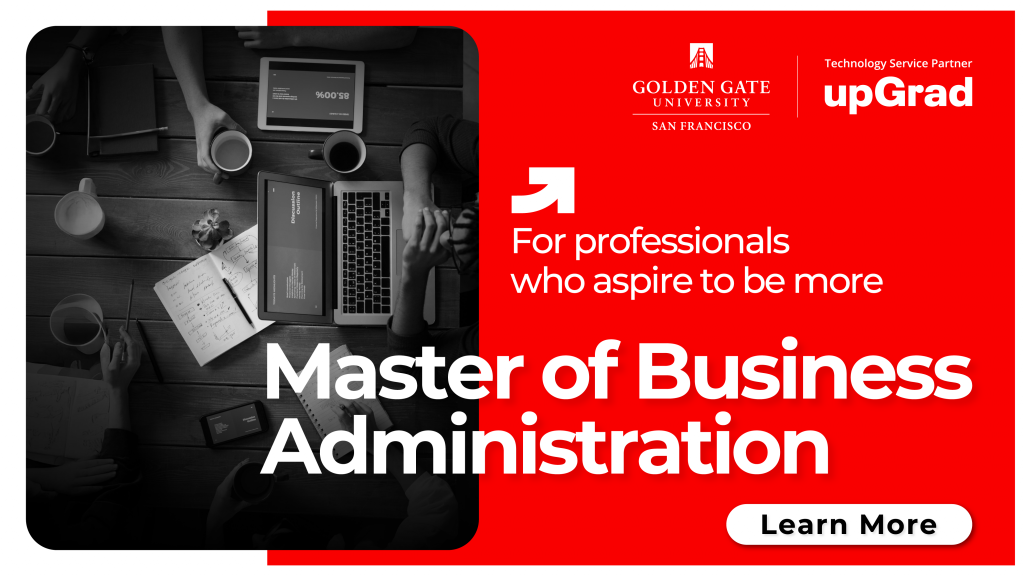Singapore is experiencing a significant demand for professionals with a Master of Business Administration (MBA) in 2026 because of its status as a global business hub. The Southeast Asian country also has internationally recognized business schools (B-schools) that offer high-quality MBA programs. Its thriving job market in sectors like technology, healthcare, and finance are important here as well.
The most crucial trends in this scenario are a greater focus on sustainability, data analytics, and artificial intelligence (AI). The growing interest of students in flexible hybrid and online formats is also a crucial factor here.
Many among these programs also have a high potential for return on investment (ROI) as they help students land jobs with competitive salaries immediately after graduation
Take your skills to the next level — Explore Online MBA Degree
Different Types of MBA Programs
The table below outlines the different types of MBA programs to help you choose the one that best aligns with your career goals.
| Type of Programme | Duration | Best For |
| Full-time MBA | 1-2 years | Early and mid-career professionals |
| Part-time MBA | 2-4 years | Working professionals |
| Executive MBA | 1-2 years | Senior professionals with at least 10 years of experience |
| Online MBA | 2-3 years (may vary) | Professionals who require flexibility |
| Global MBA | 1-2 years | People interested in international business |
Full-time MBA
Among the different types of MBA programs, full-time MBAs are the most traditional and widely recognised. They typically come in two formats based on duration: one-year and two-year programs. Regardless of which you choose, these programs demand full-time commitment, making it difficult to pursue full-time work alongside your studies. The two-year format, in particular, offers a more in-depth education, ideal for those aiming to expand their business knowledge, specialise in a specific area, and possibly complete an internship before graduation.
Also Read: Is an Online MBA in Marketing Worth It for Digital Strategy Careers in Singapore?
Part-time MBA
Part-time MBA programs are the second most popular option among the different types of business master’s degrees. These flexible programs are designed for working professionals who want to advance their business education without putting their careers on hold. By allowing learners to balance work and study, part-time MBAs offer a practical path to upskilling while gaining real-world experience.
Also Read: Affordable Online MBA Programs for Singapore Students
Executive MBA
Executive MBA programs (EMBAs) are tailored for professionals with at least 10 years of work experience, though specific requirements may vary by institution. These programs are designed to elevate your business career, often preparing you for executive or senior leadership roles by building on your existing expertise. EMBAs focus on advanced business concepts and strategic thinking, helping experienced professionals unlock new career opportunities and accelerate their growth.
Also Read: Healthcare Management: Why It’s a Hot Career in Singapore
Online MBA
Online MBA programs offer a high level of flexibility, making them ideal for working professionals. These programs allow you to attend classes remotely, eliminating the need to relocate or disrupt your career. With the convenience of learning from your computer, you can manage your job, studies, and personal life, allowing many to continue their careers seamlessly after graduation.
Also Read: Pursuing an MBA in Healthcare in Singapore: Is It the Right Path for You?
Global MBA
As businesses expand across borders, Global MBA programs are gaining prominence for their emphasis on international business practices and cross-cultural management. These programs equip you with the skills to navigate complex global markets and help you develop a broad, international perspective on business challenges and opportunities.
Also Read: Resume Tips for Online MBA Graduates
Popular MBA Specialisations in Singapore
Finance, business analytics, and marketing are among the most popular MBA specialisations in Singapore. The drivers in this case are trends like digital transformation, global business, and data-driven decision-making. Apart from these, international business, supply chain management, and entrepreneurship are the most popular options. This is because they prepare you for leadership roles in a globalized economy. Business analytics emphasises data-driven decision-making, data visualisation, and business intelligence. Digital marketing includes online brand management, marketing analytics, and digital strategy. The finance specialisation in MBA includes areas such as corporate finance, financial management, and investment banking. The MBA programs focusing on strategy prepare you for roles in management consulting and strategic planning. Supply chain management emphasises operations, optimising global supply chains, and logistics. MBA programs focusing on international business deal with areas like global trade, multinational strategies, and cross-border management.
The table below demonstrates the other most popular MBA specialisations in Singapore in 2026:
|
Broader Domain |
Specific Specialisations |
|
Technology and Analytics |
|
|
Strategy and Finance |
|
|
Global Business and Operations |
|
Apart from these, the popular specializations here are human resources (HR) and healthcare management. The main focus of the HR specialisation is on organisational leadership and talent management. The healthcare management MBA programs are tailored to create candidates who are suited to leadership roles in hospitals, healthcare consulting, and the pharmaceutical sector.
How to Choose the Right MBA Program?
Choosing the right type of MBA program is crucial for your career growth, and to make an informed decision, you should consider the following key factors:
- Assess the goals you have for your career.
- Review the expenses of pursuing your preferred programme.
- Analyse the admission requirements of the programme.
- Consider the resources that the institute is providing and its location.
- Reflect on the reputation of the institution.
- Review the courses and specialisations on offer and their overall quality.
Also Read: Secure a Loan in Singapore for Your Online MBA Program
MBA Career Opportunities in Singapore in 2026
The following table shows the top career opportunities available to MBA degree holders in Singapore in 2026:
|
Industries |
Specific Roles |
|
Finance |
|
|
Technology |
|
|
Consulting |
|
|
Marketing |
|
|
Supply Chain and Logistics |
|
Top Industries Hiring MBAs Graduates
The top industries hiring MBAs in Singapore in 2026 are finance, consulting, and technology – they have traditionally been the biggest employers of such professionals in the country. Other industries that are coming to prominence in this regard quickly are logistics, environmental, social, and governance (ESG), and healthcare.
- Technology Sector – The leading tech companies such as Google, Amazon, and Microsoft are the biggest employers of MBAs. This is especially true in roles such as digital strategy and product management.
- Consulting – It is a preferred choice for many MBA graduates in Singapore. The leading firms in this regard are McKinsey, Bain & Company, and BCG, which employ MBAs for analytical and strategic roles.
- Financial Sector – It is a prominent recruiter of MBA graduates in Singapore, with the likes of financial services providers and banks standing out in this regard.
- Logistics – Singapore is a major global logistics hub, and this is why it is a burgeoning domain for recruiting MBAs.
- Healthcare Sector – The pharmaceuticals and healthcare sector in Singapore is growing and has a high demand for MBA graduates in roles like management, strategy, and operations.
- Environmental – The need for MBA graduates in the ESG sector of Singapore is growing as well.
Why Choose MBA Programs Through upGrad?
upGrad offers access to different types of MBA degree programs, including specialisations and Executive MBAs, in collaboration with globally renowned universities. These university-led programs combine academic excellence with practical learning through real-world projects, case studies, and industry mentorship. Learners benefit from flexible online formats, career support services, and access to a global alumni network. With a focus on career outcomes and industry relevance, upGrad’s MBA programs are designed to help professionals upskill and accelerate their career growth—anytime, anywhere.
Also Read: Importance of Grades in an Online MBA Program
Accelerate your business learning and aim for the apex of success with these courses:
- MBA from O.P. Jindal Global University
- Master of Business Administration (Golden Gate University)
- Master of Business Administration from Liverpool Business School
- Master of Business Administration (Edgewood University)
For more information, email query@upgrad.com or call +65-6232-6730
🎓 Explore Our Top-Rated Courses in Singapore
Take the next step in your career with industry-relevant online courses designed for working professionals in Singapore.
FAQs on Different Types of MBA Programs
Ans: The most prominent types of MBA programs are:
Full-time MBA
Part-time MBA
Executive MBA
Online MBA
Global MBA
Ans: A General MBA is ideal for individuals looking to shift industries or roles, as it provides a broad business foundation and versatile skills that can be applied across various sectors.
Ans: MBA specialisations such as Finance, Information Technology, and Consulting usually offer the maximum earning potential. In addition to the chance to earn significant salary growth, you also get job security in these cases!
Ans: As of 2026, MBA specialisations such as the following are experiencing the maximum demand:
Finance
Technology
Management
Consulting
Data Analytics
Ans: The best jobs for MBA graduates right now are:
Investment Banker
Management Consultant
Product Manager
Data Analyst
Business Analyst
Ans: The Executive MBA (EMBA) program typically leads to the highest salaries among MBA options. This part-time program is designed for experienced professionals with over 10 years of work experience. EMBA participants are usually senior managers or executives, which means they can apply classroom insights directly to their professional projects. The program also offers strong networking opportunities and leadership-focused training, enabling graduates to secure higher-level roles and significantly boost their earning potential.












.png)








